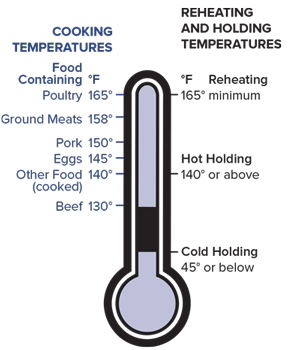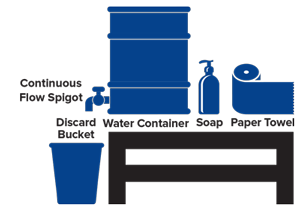Food Service Vendors: General Guidance for Temporary Food Service Establishments at Events
- Food Service Vendors: General Guidance for Temporary Food Service Establishments at Events is also available in Portable Document Format (PDF, 94KB, 2pp.; prints on legal-sized paper)
If you will be serving food at an event, even at no charge, you likely will be required to have a Temporary Food Service Establishment permit. Check with your local health department early in your planning to discuss temporary food service establishment requirements and to obtain any permit(s) you might need. Allow 3-4 weeks for processing permit applications.
Below is information about New York State requirements for Temporary Food Service Operators at events. The complete regulatory requirements for Temporary Food Service Establishments can be found in Subpart 14-2 of the New York State Sanitary Code.
Specific Requirements for Food Preparation and Storage

- Food must be prepared on site or in a health department-approved kitchen.
- Home prepared foods are not allowed.
- On-site food preparation should be limited to seasoning and cooking.
- All food must be kept covered while in holding or on display.
- During any transport, proper hot/cold holding temperatures must be maintained.
- All food must be stored at least 6 inches off the ground and placed in food safe containers.
Food Cooking/Holding Temperatures
A food thermometer (accurate to ± 2°F) must be on site and used to check cooking temperatures and hot/cold holding temperatures. Typical thermometers read from 0°F - 220°F.
Food Cold Storage
Cold holding must be 45°F or below.
- Cold storage food must be kept in refrigerators and coolers.
- Accurate thermometers (± 2°F) must be in all refrigerators and coolers.
- Ice being used to chill foods cannot be used in beverages.
Drinking Water
All water used for drinking, preparing food, and making ice (potable/consumable) must be from these sources:
- a municipal public water supply,
- a NYS or county approved water supply, such as from a restaurant, or
- certified bottled water.
All physical connections to a water supply must maintain adequate backflow prevention, such as a vacuum breaker.
Waste Water
All waste water must be disposed of in a sanitary sewer, an approved septic system, or in a holding tank.
Keep Area Clean
- The ground within the food preparation and food storage areas must be kept clean, and measures should be taken to prevent build-up of dust or mud.
- Place all garbage into trash containers with plastic bag liners.
Hand Washing

- All food handlers must be free of illness, infections, open cuts, or sores.
- Hand washing facilities must be available, conveniently located on site, and include warm water, soap, and disposable paper towels as shown.
Wash Hands
- Before starting work
- Before putting on single service gloves
- After touching raw, fresh, or frozen beef, poultry, fish, or meat
- After using the bathroom
- After smoking, eating, sneezing, or drinking
- After mopping, sweeping, removing garbage, or using the telephone
- After touching anything that might result in contamination of hands

Glove Use
Use gloves, utensils, deli paper, waxed paper, or napkins to prevent bare hand contact with all foods ready to be served to the public.
Always change gloves if they get ripped, torn, or contaminated. Contamination can occur after using the bathroom, smoking, coughing, sneezing, and in between preparing raw and cooked foods. Food workers’ hands must be washed thoroughly and be cleaned before wearing new gloves.
Dishwashing
A dishwashing station should be set up using the three sink method and sanitizing solution as shown.

Tips to Remember
- Check with your local health department early in your event planning to review all requirements.
- Follow all food handling, preparation, and storage requirements.
- Make sure food is cooked to specified cooking temperature requirements (Subpart 14-2).
- Follow proper procedures to keep food hot or cold.
- Use food thermometers to check cooking and holding temperatures.
- Be sure to use an approved water supply source when preparing food.
- Hand hygiene is important! Wash your hands often, wear your gloves, and change gloves when needed.
- Follow dishwashing procedures.
- Keep garbage in lined containers.
- Keep floors, food preparation, and storage areas clean.